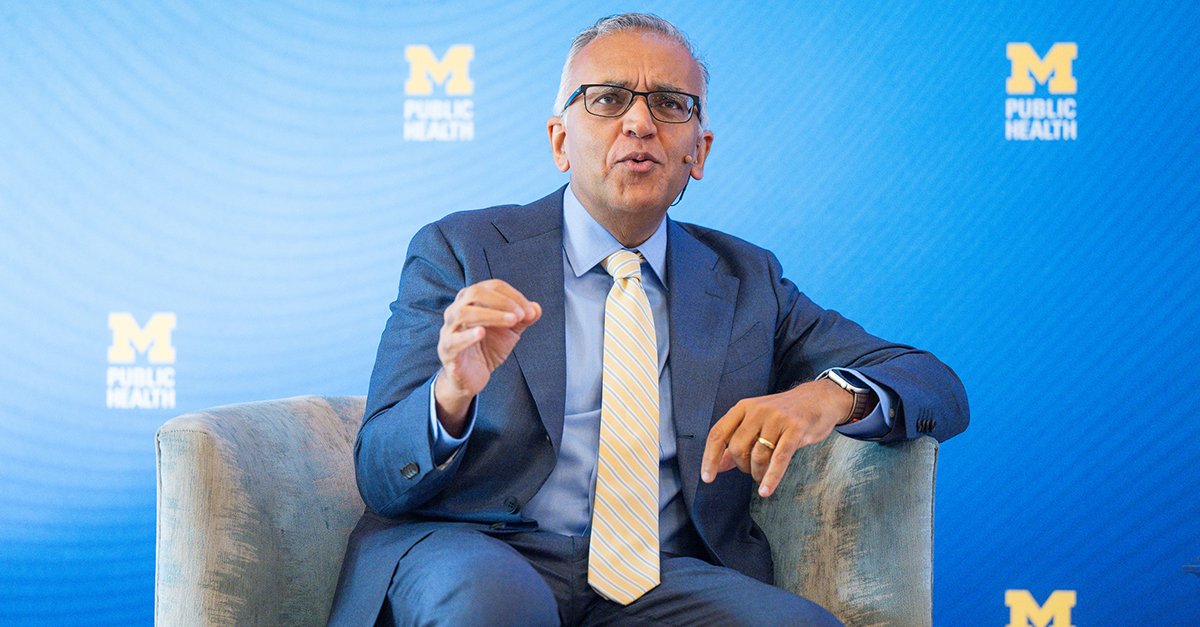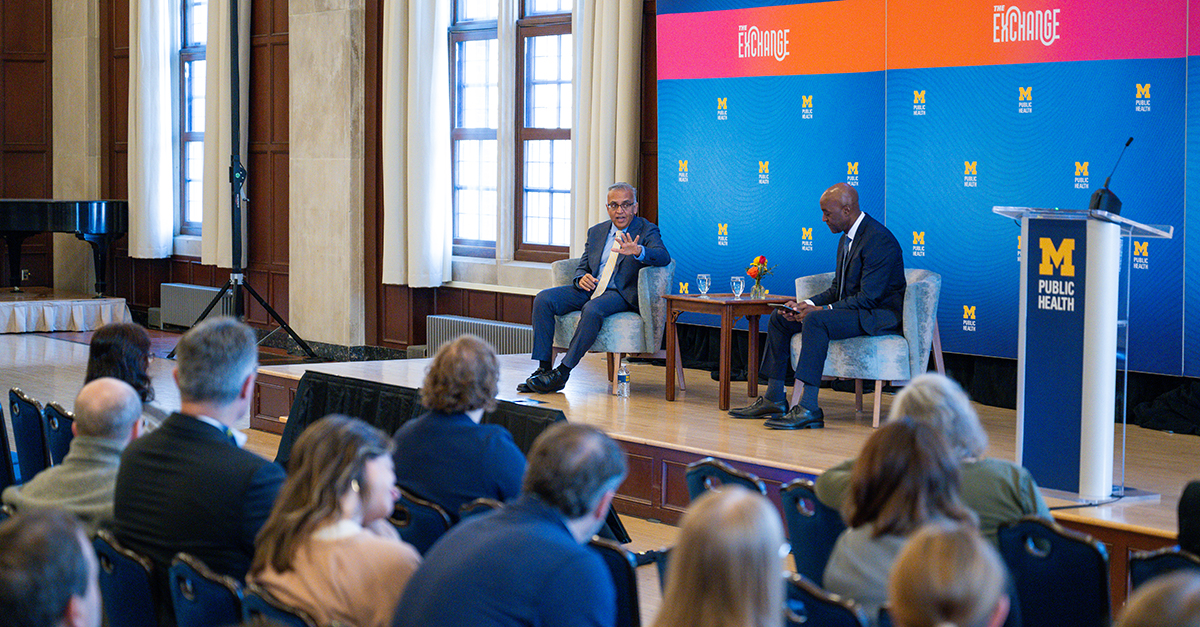Advocating for infectious disease preparedness

The Exchange keynote speaker Dr. Ashish Jha: ‘We are entering an age of biology’
ANN ARBOR—Dr. Ashish Jha didn’t mince his words: We cannot prevent pandemics.
Public health practitioners, however, can prepare for them by building robust surveillance systems, diagnostic capabilities and vaccine platforms.
“If you can’t predict and you can’t prevent, you need to prepare,” said Jha, dean of the Brown University School of Public Health and former White House COVID-19 Response Coordinator for the Biden administration.
The University of Michigan School of Public Health hosted the “Disrupting Infectious Diseases: Fighting for Our Future” seminar on Nov. 18, 2024, as part of the recently launched biannual speaker series The Exchange: Critical Conversations with Michigan Public Health.
This half-day event held in the Rogel Ballroom at the Michigan Union brought together students, staff, scholars, community partners and external stakeholders to engage in meaningful discussions about the pressing public health issues of our time, with a special focus on infectious diseases.
The event featured Jha as the keynote speaker. Jha is known globally for his pioneering work in public health research, policy and practice, especially for directing groundbreaking research on Ebola. He has played a crucial role in shaping approaches to infectious disease preparedness and healthcare policy.
During the event, Jha provided a comprehensive overview of the current landscape of infectious diseases and the challenges the world faces. With attendees both in-person and via live stream, he began his keynote address with a sobering reminder: “Infectious disease threats are always present, and it’s not really a matter of if we will face another pandemic, but the question is, when?”
We are seeing rapid changes and developments in the field of biology. From the sequencing of the human genome to the use of CRISPR technology, we are at the cusp of a new era. But with these advancements come risks, particularly from new infectious diseases and potential misuse in the form of biological weapons.”
— Dr. Ashish Jha
Jha’s address served as an urgent appeal for preparedness and proactive measures.
Drawing on historical scientific revolutions, he articulated how the world is entering an “age of biology,” where advancements in fields such as genetic engineering and synthetic biology could both pose new risks and offer unprecedented opportunities.
“We are seeing rapid changes and developments in the field of biology,” Jha said. “From the sequencing of the human genome to the use of CRISPR technology, we are at the cusp of a new era. But with these advancements come risks, particularly from new infectious diseases and potential misuse in the form of biological weapons.”
Jha didn't shy away from discussing the daunting reality of upcoming biological threats. He highlighted several factors contributing to the increased likelihood of pandemics, such as economic development leading to greater human-animal interactions, climate change altering disease vector patterns, urbanization, and globalization that accelerates disease spread.
“Everyone is at risk during an infectious disease outbreak,” Jha said. “But it is crucial to note that individuals in low-income countries are two and a half times more likely to die from infectious diseases than those in high-income countries. This inequity underscores the urgent need for global preparedness and response strategies.”
Despite the grim forecast, his talk was also a beacon of hope.
Jha shifted the focus to preparedness, emphasizing that the tools and knowledge required to manage future outbreaks are within our grasp. He elaborated on the critical components of a robust preparedness strategy, including enhancing surveillance systems, ramping up diagnostic capabilities, and investing in vaccine platforms against likely pathogens.
“Diagnostics are the cornerstone of managing a pandemic,” Jha said. “If we can enable widespread testing from day one, we can manage outbreaks without resorting to drastic measures like shutting down the economy or closing schools. This was demonstrated effectively by countries like South Korea during the COVID-19 pandemic.”
“If you can't predict and you can't prevent, you need to prepare.”
He also stressed the importance of monoclonal antibodies as a rapid-response treatment option and advocated for increased investment in vaccine research platforms to respond swiftly to novel pathogens. He pointed out the importance of breaking out of information silos and improving communication strategies across different communities to ensure effective public health messaging.
“Our society is incredibly divided,” Jha said. “To effectively manage a public health crisis, we must engage diverse communities and spread accurate information. This involves listening to and collaborating with community leaders and activists to tailor communication and intervention strategies that resonate with specific groups.”
One example he shared was the response to the mpox (formerly known as monkeypox) outbreak in 2022. He recounted how traditional methods of vaccine rollouts were initially ineffective for reaching young gay men, the primary affected group. By allowing community advocates to take the lead in communication efforts and adapting vaccination strategies to be more accessible and culturally sensitive, significant progress was made in curbing the outbreak.
“Community engagement isn't just about sharing our message; it's about co-creating solutions with those most affected,” Jha said. “This approach was critical in managing the mpox outbreak, and it serves as a model for addressing future infectious diseases.”
In a world where infectious diseases remain the second leading cause of death globally, the Michigan Public Health event highlighted the critical conversations necessary to fight for a healthier and more equitable future. Jha’s keynote and the ensuing discussions served as a reminder of the challenges ahead but also the strength, ingenuity, and collaboration required to overcome them.
“With deep community engagement, good scientific work and effective communication,” Jha said, “I am confident we can manage the risks ahead and build a healthier world for all.”

Emphasizing vaccine education, transparency
In a Q&A with Michigan Public Health Dean F. DuBois Bowman, Jha recounted his rapid induction to the White House, tackling agency coordination and public sentiment on the pandemic. He stressed the need for an orderly end to the pandemic to refocus national priorities and reflected on decision-making under scrutiny.
On media and policymakers, he underscored understanding constraints, practical advice, and consistent messaging. He advocated for constructive engagement and better training for public health professionals in interacting with media and policymakers.
Help people understand why they’re better off getting vaccinated. Help them make better decisions.”
— Dr. Ashish Jha
“There are constraints you have in every government job, every policy job,” Jha said. “So, you have to depersonalize, engage, be practical and understand the constraints. If you’re successful in doing that, policymakers will call you all the time to get your advice, and that’s how you influence the real world.”
Regarding vaccine hesitancy and long COVID, he emphasized educating the public in a non-judgmental way about vaccine benefits and investing in research to understand and treat long COVID effectively, supporting those affected.
“I think all of us have a responsibility of doing a better job spreading good information,” he said. “I really do believe the best way to counter bad information is by spreading good information. Be good curators of information—be a source of good information in your community, in your life, and all of you as students, as faculty, as staff.”
At the end of the Q&A, Jha stressed the need to depoliticize vaccines, noting the post-COVID shift from bipartisan support to partisan divides. He advocated for re-engaging the public by explaining how vaccines work, acknowledging their limitations and addressing concerns transparently. He emphasized that public health’s role is to help people make informed decisions rather than simply instructing them to get vaccinated.
“Help people understand why they’re better off getting vaccinated,” Jha said. “Help them make better decisions.”
Public health communication is key
The second half of the event included a panel discussion featuring experts from Michigan Public Health and various other sectors who delved deeper into the latest research, innovative interventions and policies related to infectious diseases. It underscored the importance of interdisciplinary collaboration, scientific discovery, and community engagement in tackling public health challenges.
The panel discussion featured Dr. Natasha Bagdasarian, MPH ’01, chief medical executive for the State of Michigan; Dr. Juan Luis S. Marquez, medical director, Livingston and Washtenaw County Health departments; and the Rev. Horace Sheffield III, CEO of the Detroit Association of Black Organizations. The discussion was moderated by Dr. Emily Martin, professor of Epidemiology at Michigan Public Health and faculty lead of Public Health IDEAS for Combating Infectious Diseases.
The panelists talked about the importance of effective communication, leveraging local trust and addressing broader social determinants of health to improve public health outcomes.
When you talk about health on the scale of what’s important, part of it is working very hard to get people to understand that they have value. When you value your life, you treat your life differently, and you treat people like they have value.”
— Rev. Horace Sheffield III
They highlighted the need to address people's questions without dismissing them and acknowledge the changing dynamics in public health messaging, particularly regarding vaccines.
Bagdasarian pointed out the significance of using trusted community members to relay information and ensure that the messages resonate with different communities.
“One of the things that I think a lot about is, how do we communicate to folks the information they need to know?” she said. “How do we join in in a way that is respectful, that acknowledges some of the questions that they may have and doesn't dismiss their questions?”
Marquez, who began his role six months before the COVID-19 pandemic took hold in the US, said his public health experience has been shaped by pandemic response, highlighting the importance of continually practicing and improving response strategies for various outbreaks, including measles and foodborne diseases.
“We really need to continue to strive to improve in this area,” he said, “because pandemic response should not be our only sort of response.”
Sheffield underscored the necessity of community organization and self-improvement, particularly in civil rights and health.
“When you talk about health on the scale of what’s important, part of it is working very hard to get people to understand that they have value,” he said. “When you value your life, you treat your life differently, and you treat people like they have value.”
